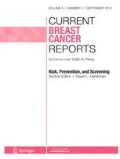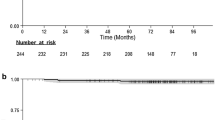Abstract
The decision of using a treatment modality is essentially based on the benefit it can offer. This can be further refined to identify a subset that stand to benefit the most. This has been successful in planning systemic therapy; unfortunately for loco-regional treatment (LRT) there has been association with numerous risk predictors but no response predictors have been identified. In this review we discuss the evidence of efficacy for LRT based on various risk predictors matched with effective targeted treatment (Hormone therapy and Her2 targeted therapy) and its impact on local control. The largest risk predictors known are the triple negative (TNBC) subset and it is not surprising that postmastectomy radiotherapy has shown a remarkable benefit in TNBC, irrespective of lymph node status. Similarly, one could advocate conservatism in low risk patients who stand to benefit maximum from systemic therapy (ER + ve) and avoid radiotherapy with minimal trade off.
Similar content being viewed by others
References
Papers of particular interest, published recently, have been highlighted as: • Of importance •• Of major importance
Halsted WS. I. The results of radical operations for the cure of carcinoma of the breast. Ann Surg. 1907;46:1–19.
Perou CM, Sorlie T, Eisen MB, et al. Molecular portraits of human breast tumours. Nature. 2000;406:747–52.
Rouzier R, Perou CM, Symmans WF, et al. Breast cancer molecular subtypes respond differently to preoperative chemotherapy. Clin Cancer Res. 2005;11:5678–85.
Haffty BG, Buchholz TA. Molecular predictors of loco-regional recurrence in breast cancer: ready for prime time? J Clin Oncol. 2010;28:1627–9.
Wazer DE. Measuring the value of radiotherapy in older women with breast cancer. J Clin Oncol. 2012;30:2809–11.
Albert JM, Liu DD, Shen Y, et al. Nomogram to predict the benefit of radiation for older patients with breast cancer treated with conservative surgery. J Clin Oncol. 2012;30:2837–43.
Voduc KD, Cheang MC, Tyldesley S, et al. Breast cancer subtypes and the risk of local and regional relapse. J Clin Oncol. 2010;28:1684–91. Elaborate description of heterogenity of molecular subtypes and resposes.
Nguyen PL, Taghian AG, Katz MS, et al. Breast cancer subtype approximated by estrogen receptor, progesterone receptor, and HER-2 is associated with local and distant recurrence after breast-conserving therapy. J Clin Oncol. 2008;26:2373–8.
Millar EK, Graham PH, O’Toole SA, et al. Prediction of local recurrence, distant metastases, and death after breast-conserving therapy in early-stage invasive breast cancer using a five-biomarker panel. J Clin Oncol. 2009;27:4701–8.
Albert JM, Gonzalez-Angulo AM, Guray M, et al. Estrogen/progesterone receptor negativity and HER2 positivity predict loco-regional recurrence in patients with T1a, bN0 breast cancer. Int J Radiat Oncol Biol Phys. 2010;77:1296–302.
Freedman GM, Anderson PR, Li T, et al. Loco-regional recurrence of triple-negative breast cancer after breast-conserving surgery and radiation. Cancer. 2009;115:946–51.
Fisher B, Anderson S, Bryant J, et al. Twenty-year follow-up of a randomized trial comparing total mastectomy, lumpectomy, and lumpectomy plus irradiation for the treatment of invasive breast cancer. N Engl J Med. 2002;347:1233–41.
Fisher B, Brown A, Mamounas E, et al. Effect of preoperative chemotherapy on loco-regional disease in women with operable breast cancer: findings from National Surgical Adjuvant Breast and Bowel Project B-18. J Clin Oncol. 1997;15:2483–93.
Mamounas EP. NSABP Protocol B-27. Preoperative doxorubicin plus cyclophosphamide followed by preoperative or postoperative docetaxel. Oncology. 1997;11(6 Suppl 6):37–40.
Rausei S, Rovera F, Dionigi G, Tornese D, Fachinetti A, Boni L, et al. Predictors of loco-regional recurrence and cancer-related death after breast cancer surgery. Breast J. 2010;16 Suppl 1:S29–33.
Cheng SH, Horng CF, West M. Genomic prediction of loco-regional recurrence after mastectomy in breast cancer. J Clin Oncol. 2006;24:4594–602. Gene expression profiling and breast cancer subtypes and treatment overview of molecular role in risk prediction after mastectomy.
Dent R, Trudeau M, Pritchard KI, et al. Triple negative breast cancer: clinical features and patterns of recurrence. Clin Cancer Res. 2007;13:4429–34.
Moran M. Should triple-negative breast cancer (TNBC) subtype affect local-regional therapy decision making? ASCO Univ. 2014. Available at: http://meetinglibrary.asco.org/content/11400032-144.
Abdulkarim BS, Cuartero J, Hanson J, et al. Increased risk of loco-regional recurrence for women with T1-2N0 triple-negative breast cancer treated with modified radical mastectomy without adjuvant radiation therapy compared with breast-conserving therapy. J Clin Oncol. 2011;29:2852–8. Hypothesis generating study.
Parker CC, Ampil F, Burton G, et al. Is breast conservation therapy a viable option for patients with triple-receptor negative breast cancer? Surgery. 2010;148:386–91.
Haffty BG, Yang Q, Reiss M, et al. Loco-regional relapse and distant metastasis in conservatively managed triple negative early-stage breast cancer. J Clin Oncol. 2006;24:5652–7.
Freedman GM, Anderson PR, Li T, et al. Loco-regional recurrence of triple negative breast cancer after breast-conserving surgery and radiation. Cancer. 2009;115:946–51.
Panoff JE, Hurley J, Takita C, et al. Risk of loco-regional recurrence by receptor status in breast cancer patients receiving modern systemic therapy and postmastectomy radiation. Breast Cancer Res Treat. 2011;128:899–906.
Paik S, Tang G, Shak S, et al. Gene expression and benefit of chemotherapy in women with node-negative, estrogen receptor-positive breast cancer. J Clin Oncol. 2006;24:3726–34.
Gianni L, Zambetti M, Clark K, et al. Gene expression profiles in paraffin embedded core biopsy tissue predict response to chemotherapy in women with locally advanced breast cancer. J Clin Oncol. 2005;23:7265–77.
Solin LJ, Hwang WT, Vapiwala N. Outcome after breast conservation treatment with radiation for women with triple-negative early-stage invasive breast carcinoma. Clin Breast Cancer. 2009;9:96–100.
Wang J, Xie X, Wang X, et al. Loco-regional and distant recurrences after breast conserving therapy in patients with triple-negative breast cancer: a meta-analysis. Surg Oncol. 2013;22:247–55.
Lowery A, Kell M, Glynn R, Kerin M, Sweeney K. Loco-regional recurrence after breast cancer surgery: a systematic review by receptor phenotype. Breast Cancer Res Treat. 2012;133:831–41.
Krag DN, Anderson SJ, Julian TB, et al. Sentinel-lymph-node resection compared with conventional axillary-lymph-node dissection in clinically node-negative patients with breast cancer: overall survival findings from the NSABP B-32 randomised phase 3 trial. Lancet Oncol. 2010;10:927–33.
Giuliano AE, Hunt KK, Ballman KV, et al. Axillary dissection vs no axillary dissection in women with invasive breast cancer and sentinel node metastasis: a randomized clinical trial. JAMA. 2011;305:569–75.
Rutgers EJ, Donker M, Straver ME, et al. Radiotherapy or surgery of the axilla after a positive sentinel node in breast cancer patients: final analysis of the EORTC AMAROS trial (10981/22023). J Clin Oncol. 2013;31(Suppl); [Abstract LBA1001].
Oliveira M, Cortés J, Bellet M, et al. Management of the axilla in early breast cancer patients in the genomic era. Ann Oncol. 2013;24:1163–70.
Wo JY, Chen K, Neville BA, et al. Effect of very small tumor size on cancer-specific mortality in node-positive breast cancer. J Clin Oncol. 2011;29:2619–27.
Hernandez-Aya LF, Chavez-MacGregor M, Lei X, et al. Nodal status and clinical outcomes in a large cohort of patients with triple-negative breast cancer. J Clin Oncol. 2011;29:2628–34.
Comen EA, Norton L. Breast cancer tumor size, nodal status, and prognosis: biology trumps anatomy. J Clin Oncol. 2011;29:2610–2.
Effect of radiotherapy after mastectomy and axillary surgery on 10-year recurrence and 20-year breast cancer mortality: meta-analysis of individual patient data for 8135 women in 22 randomised trials. EBCTCG (Early Breast Cancer Trialists Collaborative Group). Lancet. 2014;383:2127–35.
Kaplan HG, Malmgren JA, Atwood M. T1N0 triple negative breast cancer: risk of recurrence and adjuvant chemotherapy. Breast J. 2009;15:454–60.
Kyndi M, Sorensen FB, Knudsen H, et al. Estrogen receptor, progesterone receptor, HER-2, and response to postmastectomy radiotherapy in high-risk breast cancer: the Danish Breast Cancer Cooperative Group. J Clin Oncol. 2008;26:1419–26.
Wang J, Shi M, Ling R, et al. Adjuvant chemotherapy and radiotherapy in triple-negative breast carcinoma: a prospective randomized controlled multi-center trial. Radiother Oncol. 2011;100:200–4. Randomised study of PMRT in early breast cancer level one evidence.
Goldhirsch A, Winer EP, Coates AS, et al. Personalizing the treatment of women with early breast cancer: highlights of the St Gallen International Expert Consensus on the Primary Therapy of Early Breast Cancer 2013. Ann Oncol. 2013;24:2206–23.
Smith BD, Arthur DW, Buchholz TA, et al. Accelerated partial breast irradiation consensus statement from the American Society for Radiation Oncology (ASTRO). Int J Radiat Oncol Biol Phys. 2009;74:987–1001.
Radiation Therapy Oncology Group. NSABP Protocol B-39/RTOG Protocol 0413: a randomized phase III study of conventional whole breast irradiation (WBI) vs partial breast irradiation (PBI) for women with stage 0, I, or II breast cancer. Available at: www.rtog.org/members/protocols/0413/0413.pdf
Vaidy JS, Wenz F, Bulsara M, et al. Risk-adapted targeted intraoperative radiotherapy vs whole-breast radiotherapy for breast cancer: 5-year results for local control and overall survival from the TARGIT-A randomised trial. Lancet. 2014;383:603–13.
Hughe KS, Schnaper AL, Bellon JR, et al. Lumpectomy plus tamoxifen with or without irradiation in women age 70 years or older with early breast cancer: long-term follow-up of CALGB 9343. J Clin Oncol. 2013;31:2382–7.
Kunkler I, Williams LW, Jack Wet, et al. The PRIME II trial: wide local excision and adjuvant hormonal therapy ± postoperative whole breast irradiation in women ≥ 65 years with early breast cancer managed by breast conservation. Abstract #S2-01. Presented at: San Antonio Breast Cancer Symposium: San Antonio; Dec 10–14, 2013
Bouganim N, Tsvetkova E, Clemons M, Amir E. Evolution of sites of recurrence after early breast cancer over the last 20 years: implications for patient care and future research. Breast Cancer Res Treat. 2013;139:603–6.
Mamounas EP, Tang G, Liu Q. The importance of systemic therapy in minimizing local recurrence after BCS: the NSABP experience. J Surg Oncol. 2014;110:45–50.
Goldhirsch A, Winer EP, Coates AS, et al. Personalizing the treatment of women with early breast cancer: highlights of the St Gallen International Expert Consensus on the Primary Therapy of Early Breast Cancer 2013. Ann Oncol. 2013;24:2206–23.
Anderson SJ, Wapnir I, Dignam JJ, et al. Prognosis after ipsilateral breast tumor recurrence and loco-regional recurrences in patients treated by breast‐conserving therapy in five National Surgical Adjuvant Breast and Bowel Project protocols of node‐negative breast cancer. J Clin Oncol. 2009;27:2466–73.
Wapnir IL, Anderson SJ, Mamounas EP, et al. Prognosis after ipsilateral breast tumor recurrence and loco-regional recurrences in five National Surgical Adjuvant Breast and Bowel Project node positive adjuvant breast cancer trials. J Clin Oncol. 2006;24:2028–37.
Caudle AS, Yu TK, Tucker SL, et al. Local-regional control according to surrogate markers of breast cancer subtypes and response to neoadjuvant chemotherapy in breast cancer patients undergoing breast conserving therapy. Breast Cancer Res. 2012;14:R83.
Compliance with Ethics Guidelines
Conflict of Interest
Nita S. Nair and Rajendra A. Badwe declare that they have no conflicts of interest.
Human and Animal Rights and Informed Consent
This article does not contain any studies with human or animal subjects performed by any of the authors.
Author information
Authors and Affiliations
Corresponding author
Rights and permissions
About this article
Cite this article
Nair, N.S., Badwe, R.A. Loco-Regional Therapy for Early and Advanced Breast Cancer in the Molecular Era. Curr Breast Cancer Rep 6, 267–274 (2014). https://doi.org/10.1007/s12609-014-0162-z
Published:
Issue Date:
DOI: https://doi.org/10.1007/s12609-014-0162-z




